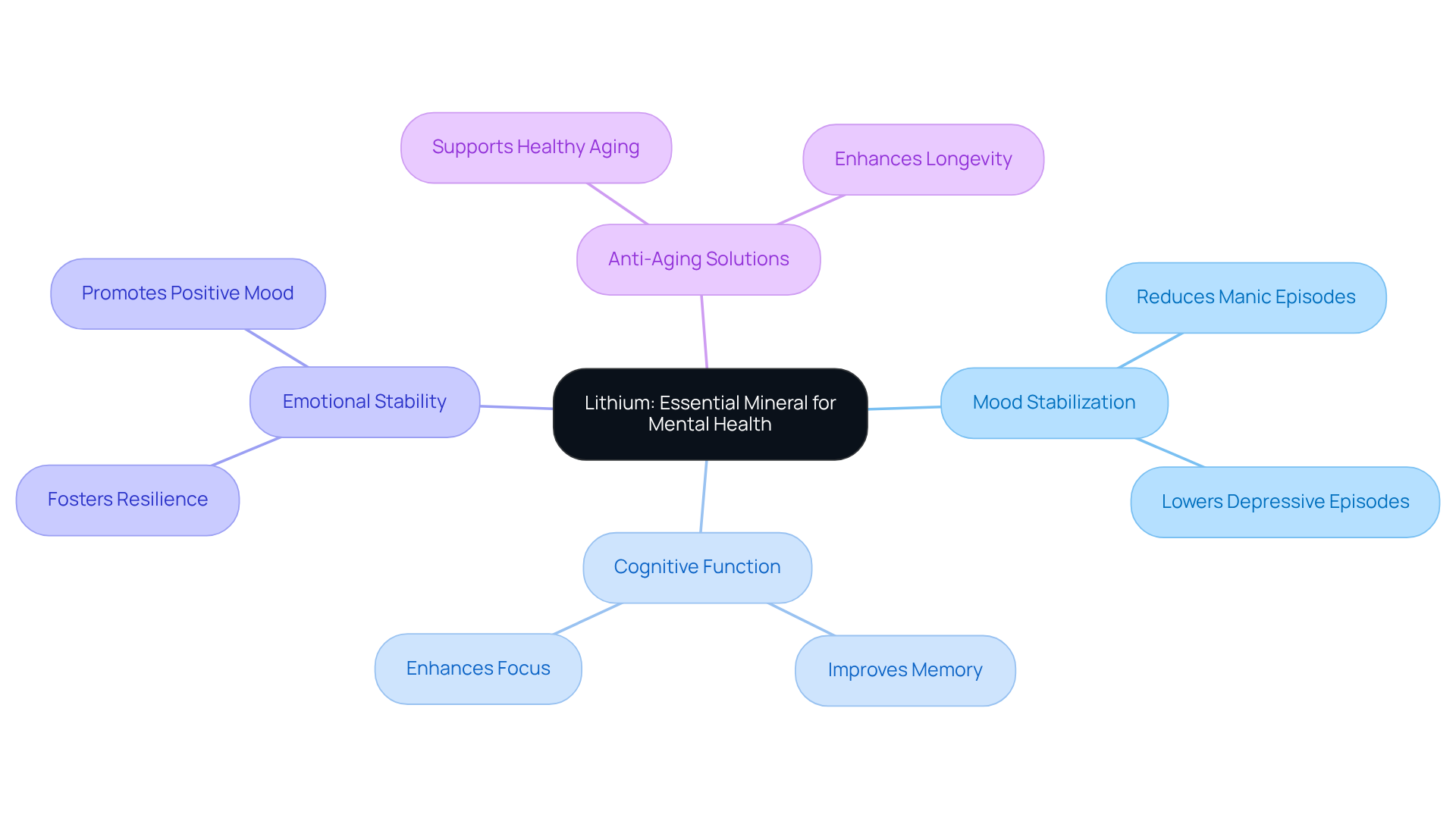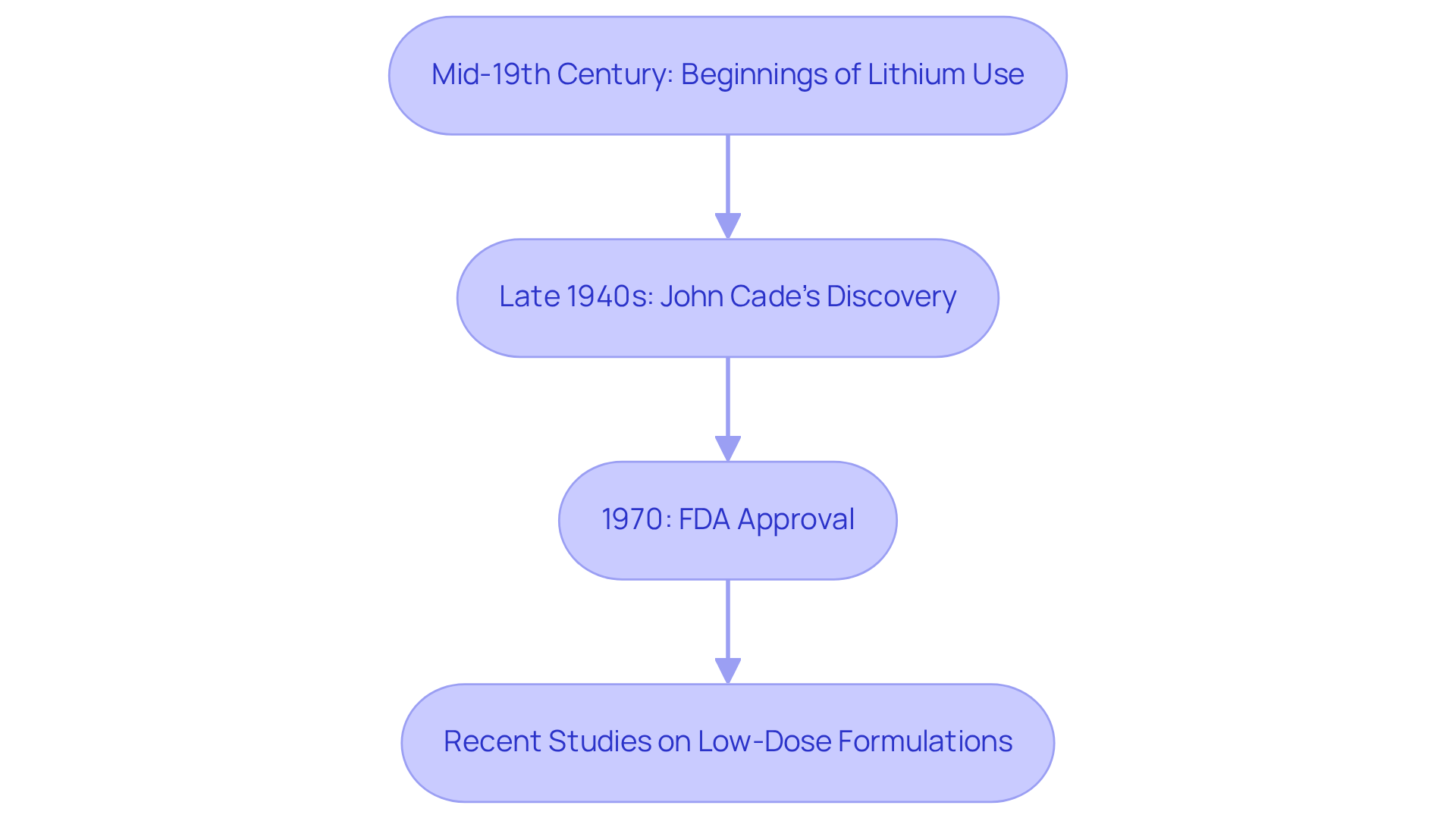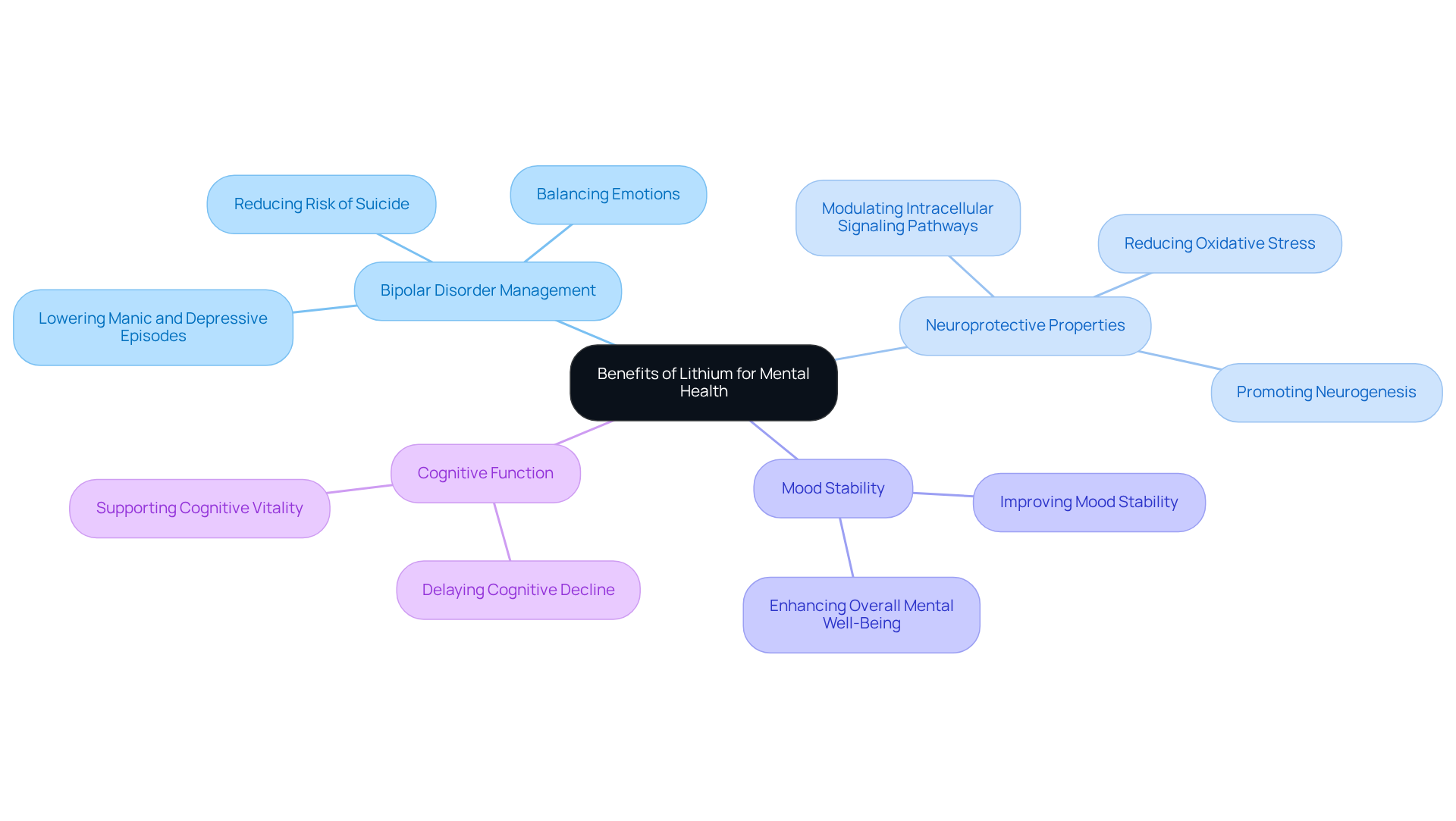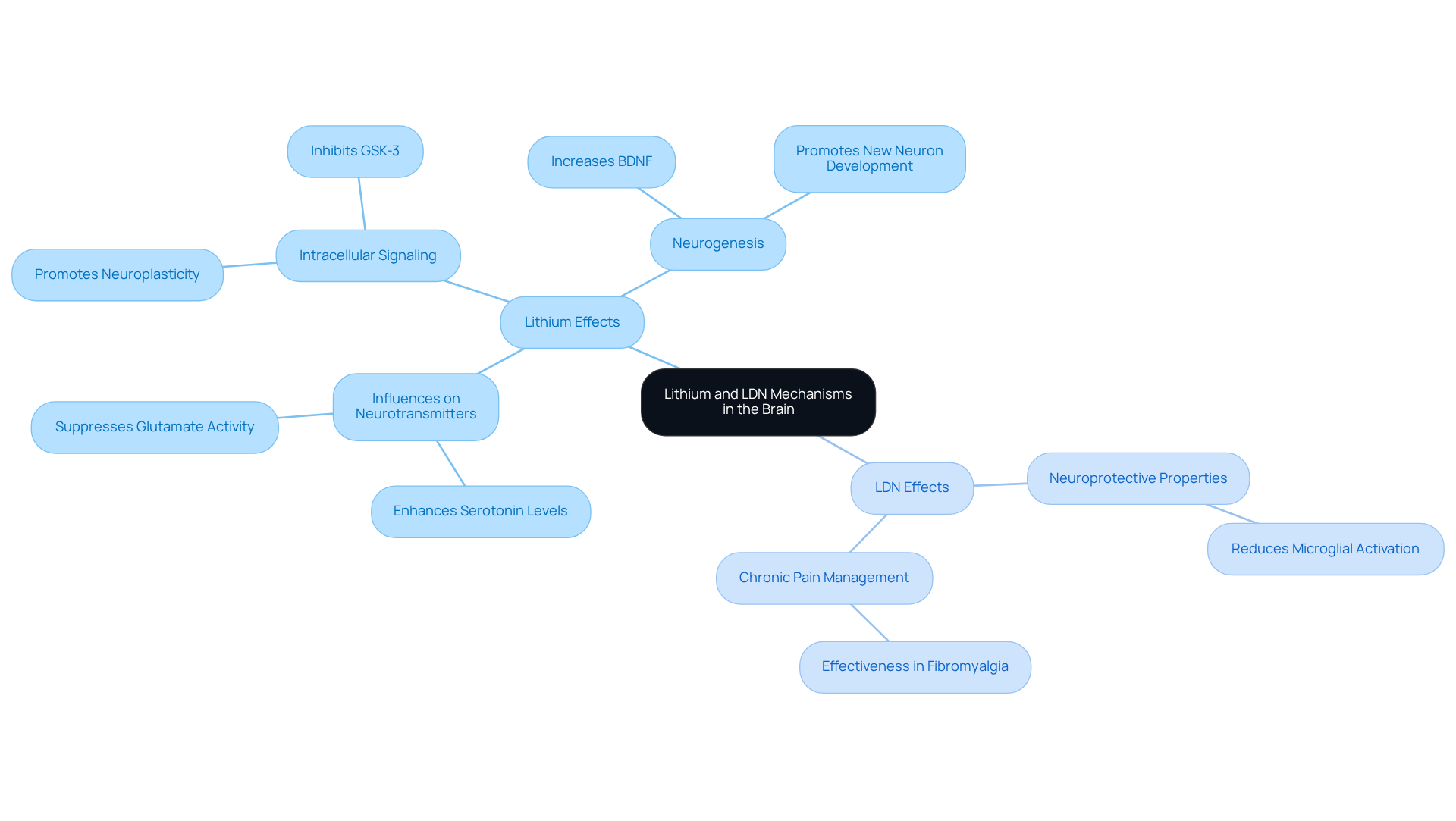Understanding Lithium Benefits for Mental Health and Wellness
Overview
Lithium is recognized for its benefits to mental health, serving as a mood stabilizer that effectively manages conditions such as bipolar disorder. Additionally, it has the potential to enhance cognitive function and promote emotional stability. This article highlights lithium’s neuroprotective properties and its historical significance in treating mood disorders. Furthermore, emerging evidence suggests that low-dose supplementation of lithium may contribute to overall mental wellness and longevity.
As we explore these facets, it becomes clear that lithium’s role in mental health is multifaceted. Its ability to stabilize mood can lead to improved quality of life for individuals with mood disorders. In addition, the growing body of research surrounding its neuroprotective effects opens new avenues for understanding how lithium can support cognitive health.
In conclusion, considering lithium’s potential benefits, exploring its use in low doses for mental wellness is worth investigating. For those interested in enhancing their mental health, further resources on lithium supplementation may provide valuable insights.
Introduction
The significance of lithium in mental health is profound, as this essential mineral has been a cornerstone in the treatment of mood disorders for decades. With its proven ability to stabilize emotions and mitigate the extremes of bipolar disorder, lithium is now being explored for broader applications, including cognitive enhancement and emotional well-being.
As interest in low-dose lithium supplementation grows, questions arise:
- Can this mineral truly unlock new pathways to mental wellness?
- What are the potential risks and rewards of incorporating it into everyday health regimens?
Exploring these questions may lead to a deeper understanding of lithium’s role in mental health.
Define Lithium: An Essential Mineral for Mental Health
Lithium benefits are significant, as this naturally occurring mineral, classified as an alkali metal, plays a crucial role in various physiological processes, particularly in emotional regulation and mental health. This medication acts as a mood stabilizer and is recognized for its effectiveness in treating mood disorders, especially bipolar disorder, highlighting the lithium benefits it offers. It significantly reduces the frequency and severity of manic and depressive episodes.
Recent studies indicate that low-dose mineral supplementation may improve cognitive function and foster emotional stability in the general population. For health-conscious individuals exploring anti-aging solutions, integrating this mineral into a health-focused diet could be advantageous. While typically absent in common dietary sources, the lithium benefits for enhancing longevity and emotional health align with ByKomi’s mission to boost vitality through informed decisions.
Considering mineral supplementation under professional guidance may offer additional support in the pursuit of healthy aging and overall well-being. This approach complements other innovative therapies and dietary supplements that contribute to anti-aging strategies.

Trace the History of Lithium in Mental Health Treatment
The journey of this element in mental health treatment began in the mid-19th century. However, it gained significant attention in the late 1940s when Australian psychiatrist John Cade discovered its mood-stabilizing properties. Cade’s groundbreaking research demonstrated that this element could effectively treat manic episodes associated with bipolar disorder, establishing it as the gold standard for mood stabilization.
This crucial discovery resulted in the approval of the element by the U.S. Food and Drug Administration (FDA) in 1970. Despite its long history, recent studies have reignited interest in this element, particularly in low-dose formulations that may offer broader applications for mental health and cognitive enhancement. It is important to note that this substance has a narrow therapeutic index, which increases the risk of toxicity, making careful monitoring essential.
As stated by the International Society for Bipolar Disorders, this medication continues to be a primary treatment choice for emotional stabilization, highlighting its importance in handling emotional conditions. As research progresses, the developing comprehension of this element’s various therapeutic advantages emphasizes the lithium benefits that extend beyond emotional stabilization. This opens avenues for creative methods in mental health treatment.

Examine the Benefits of Lithium for Mental Health Conditions
Lithium is widely recognized for its role in managing bipolar disorder, effectively balancing emotions and reducing the risk of both manic and depressive episodes. Beyond this primary use, research highlights the neuroprotective properties of lithium, suggesting it may lower the risk of cognitive decline and dementia. Studies indicate that lithium can significantly reduce the occurrence of suicide and self-injurious behaviors, underscoring its importance in treating severe emotional conditions.
Furthermore, emerging evidence points to the lithium benefits of low-dose lithium supplementation in enhancing overall mental well-being, improving mood stability, and supporting cognitive function, even in individuals without diagnosed mood disorders. This positions lithium benefits not only as a treatment for specific conditions but also as a potential ally in promoting long-term mental health and cognitive vitality.
Moreover, low-dose lithium supplementation may offer lithium benefits by exerting neuroprotective and anti-aging effects through several mechanisms, including:
- Modulating intracellular signaling pathways
- Reducing oxidative stress
- Promoting neurogenesis
This supplementation has been associated with prolonged lifespan and improved wellness, delaying the onset of age-related ailments and cognitive decline. As such, it presents an appealing option for individuals who are mindful of their well-being and seek to enhance their mental wellness and longevity.

Understand the Mechanisms of Lithium’s Action in the Brain
Lithium’s mechanisms of action are complex and not yet fully understood. It is believed to influence neurotransmitter systems, particularly by enhancing serotonin levels and suppressing glutamate activity, which contributes to emotional stability. Lithium also impacts intracellular signaling pathways, notably inhibiting glycogen synthase kinase-3 (GSK-3), an enzyme involved in various cellular processes, including neuroplasticity and cell survival. Furthermore, this element has been shown to promote the development of new neurons and increase brain-derived neurotrophic factor (BDNF), essential for cognitive health.
In addition to lithium, Low-Dose Naltrexone (LDN) has emerged as a promising option for enhancing brain function, particularly concerning neurodegenerative conditions and emotional challenges. Could LDN’s neuroprotective effects stem from its ability to reduce microglial activation, a common feature in several neurological disorders? Furthermore, LDN has demonstrated effectiveness in managing chronic pain conditions, such as fibromyalgia, which can significantly affect mental well-being.
These neuroprotective properties contribute to the lithium benefits in treating mood disorders and enhancing cognitive health. By understanding these mechanisms, we can explore further resources and treatments that may improve mental and emotional well-being.

Conclusion
Lithium emerges as a vital mineral with profound implications for mental health and emotional stability. Its role as a mood stabilizer is well-established, particularly in the treatment of bipolar disorder, where it effectively mitigates the intensity and frequency of mood swings. Recent insights into low-dose lithium supplementation suggest that its benefits extend beyond clinical applications, potentially enhancing cognitive function and fostering emotional resilience in the general population.
Throughout this discussion, key points illustrate lithium’s historical significance and its evolving reputation in mental health treatment:
- From its discovery in the mid-19th century
- To its FDA approval in 1970
- And the resurgence of interest in low-dose formulations
Lithium’s therapeutic potential continues to be explored. The neuroprotective properties of lithium, along with its ability to support cognitive health and reduce the risk of severe emotional disturbances, underscore its importance in both clinical and preventive contexts.
The implications of lithium for mental health are far-reaching, suggesting that its integration into health and wellness strategies could be transformative. As research progresses, the potential for lithium to act as a cornerstone in both treatment and preventive measures becomes increasingly evident. Embracing informed approaches to lithium supplementation may not only enhance individual well-being but also contribute to broader societal advancements in mental health care.
Frequently Asked Questions
What is lithium and what role does it play in mental health?
Lithium is a naturally occurring mineral classified as an alkali metal, which plays a crucial role in emotional regulation and mental health. It acts as a mood stabilizer and is effective in treating mood disorders, particularly bipolar disorder.
How does lithium benefit individuals with mood disorders?
Lithium significantly reduces the frequency and severity of manic and depressive episodes in individuals with mood disorders, highlighting its effectiveness as a treatment option.
Can low-dose lithium supplementation improve cognitive function?
Yes, recent studies suggest that low-dose lithium mineral supplementation may improve cognitive function and foster emotional stability in the general population.
Is lithium commonly found in dietary sources?
Lithium is typically absent in common dietary sources, which makes supplementation an important consideration for those seeking its benefits.
How can lithium contribute to anti-aging solutions?
Integrating lithium into a health-focused diet may enhance longevity and emotional health, making it a potential component of anti-aging strategies.
Should individuals consider professional guidance when supplementing with lithium?
Yes, considering mineral supplementation under professional guidance may provide additional support in achieving healthy aging and overall well-being.






